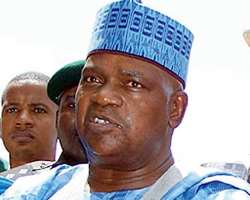Goje, Others Have A Case To Answer, Rules Court

SAN FRANCISCO, March 20, (THEWILL) - A Federal High Court sitting in Gombe, Gombe State, on Tuesday ruled that a former governor of the state, Alhaji Danjuma Goje, and four others currently being prosecuted by the Economic and Financial Crimes Commissions (EFCC) for offences related to conspiracy and money laundering, have a case to answer. The court also ruled that the EFCC has powers to prosecute the accused persons based on the Act setting it up.
The former governor and four accused persons who are being prosecuted before Justice Olaide Babatunde Quadri had filed two motions on notice seeking to quash the 18-count charge brought against them by the Commission.
They argued through their counsels that the EFCC lacked competence to investigate and prosecute them, and that the court similarly lacked jurisdiction to try them in respect of the charges especially as the counts did not disclose any prima facie case against them. The other four accused persons are Aliyu El-Nafaty, Sambo Tumu, S.M. Dakoro, and S.M. Dakoro Gombe (a company).
It would be recalled that in December 2011, both the prosecution and defence counsels had argued their positions. Defence Counsel, Adeniyi Akintola (SAN) argued that the charges, as constituted and filed by the Commission before the court, were dead on arrival. He noted that the first accused person, Danjuma Goje in counts one and seven of the charges, which bordered on conspiracy, was portrayed to have conspired with himself, a fact he claimed was impossible from the point of law.
He further argued that the charges were predicated on a non-existing law, the Money Laundering Act 2004, which, according to him, has been repealed by section 21 of the 2011 Money Laundering Act. He said that the use of the phrase ‘as amended, modified and retained’ in the charges was wrong, as the 2004 Act had been outright repealed. He bickered that sections 16, 17, 18, and 19 are not applicable to the accused persons who, in his opinion, did not commit any offence.
Arguing further, Akintola said that the governor, for instance, was given executive powers by the constitution to act ‘executively, by fiat, even in the award of contracts or appropriation without responding to anybody.’
He claimed that the charges were based on anonymous fictitious petitions, referring to the complaints as ‘beer parlour gossip.’ He went further to state that even if the management and allocation by the executive needed any inquiry, the State House of Assembly was constitutionally empowered to do so.
Prosecution Counsel, Wahab Shittu, on the contrary, vehemently opposed submissions by the defence that the court should quash the charges against the accused persons. He queried what the defence was asking the court to do.
“Is it to foreclose the trial process in spite of the presumption of innocence until proven otherwise? Is it asking the court not to test the evidence (oral and documentary), the veracity, demeanour, accuracy, or credibility of witnesses before the court? Is defence asking the court not to listen to the 23 or more witnesses and 14 witness statements that are ready for the trial? Will the court not allow trial to take place when the accused persons have explanations to make”? He urged the court to disregard the submissions made by defence.
Justice Quadri, in his ruling, upheld the positions of prosecution as he quoted copiously from several authorities and references to support his judgment. He maintained that the EFCC had powers to prosecute the accused persons based on the Act setting it up; and that the Court has jurisdiction to hear the case. He also adjourned the case to May 8th and 9th, 2012, for accelerated trial.
